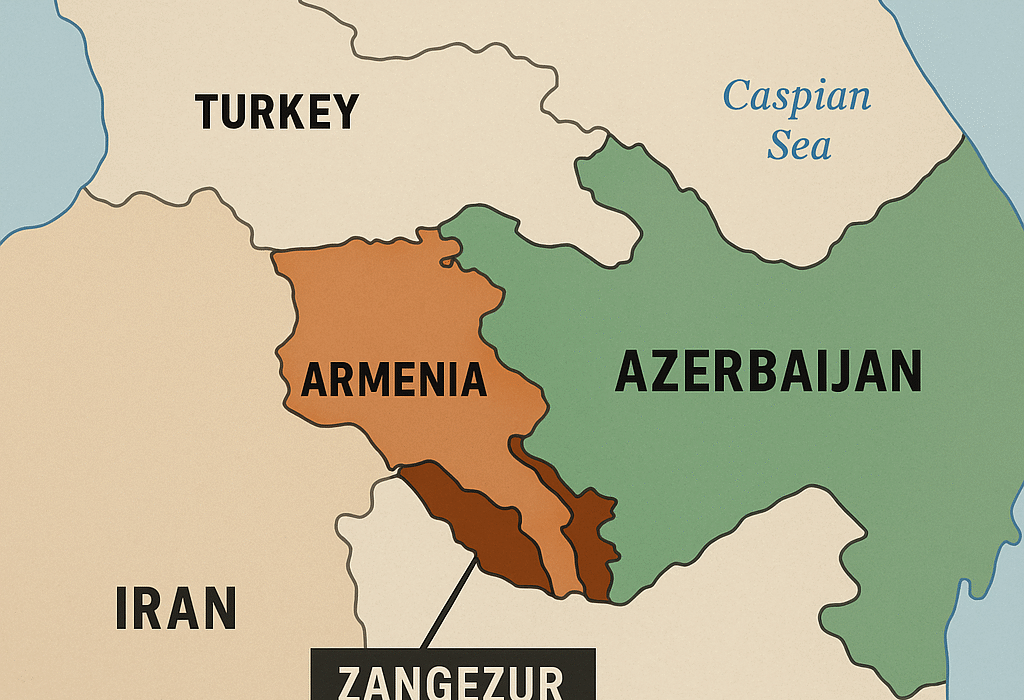by Turan Rzayev
Azerbaijan’s Assistant to the President and Head of the Foreign Policy Affairs Department of the Presidential Administration, Hikmat Hajiyev, addressed reports about an American company’s involvement in the Zangezur Corridor in an interview with Germany’s Berliner Zeitung. Hajiyev emphasized that the issue ultimately depends on Armenia’s decision.
“If they [Armenia] are working with U.S. companies, that’s their business. We are doing what is required of us: strengthening our transport connections with Georgia, Iran, and Russia. These projects will benefit the entire region. If Armenia is willing, we are ready to cooperate on the Trans-Caucasus corridor,” he said.
Hajiyev’s remarks can be interpreted as Baku’s direct message to Yerevan, and an indirect but clear response to Washington. As is known, a controversial article recently published in Spain’s Periodista Digital claimed that the Armenian government had agreed to hand control of the Zangezur Corridor—which will link mainland Azerbaijan with Nakhchivan—to the United States. The article alleged that a memorandum had already been signed, detailing the construction of a 42-kilometer route through Armenia’s Syunik region (Zangezur). It also claimed the corridor had been provisionally named the “Trump Bridge.”
The most striking claim is that the corridor would be managed by a private American company—not by a regular army, but by a private military force consisting of around 1,000 armed personnel. These forces would ensure the corridor’s security, while only 30% of its revenue would be allocated to Armenia.
According to the report, the memorandum has already been approved by Armenia, Azerbaijan, and the United States. However, based on Hikmat Hajiyev’s statement, it is evident that no such official agreement exists. It is possible that Washington proposed such a memorandum and applied some pressure, but unlike Yerevan, Baku is not expected to accept it.
Azerbaijan’s policy toward the Zangezur Corridor is pragmatic and multi-dimensional. Baku promotes regional economic integration while cautiously addressing potential security risks. Even though the details of the alleged U.S.-Armenia memorandum have not been officially confirmed, such a proposal does not align with Azerbaijan’s interests—particularly the involvement of a foreign private military force in controlling the corridor.
The addition of a military component by the United States and the attempt to shift the regional balance of power contradicts Azerbaijan’s strategic vision. If Baku had any intention of transferring control of the corridor to another power, it would have continued cooperation with Russia instead. In this context, Hajiyev’s remarks reflect Azerbaijan’s cautious and reserved approach to the U.S. proposal—without explicitly rejecting it.
Azerbaijan has made it clear: who Armenia works with on this project is its own choice. But Baku conducts its energy and transportation policy based on the principle of sovereignty.
By developing alternative routes, Baku maintains political flexibility and strengthens its position in negotiations with Yerevan. Hajiyev’s words—”We are strengthening our transport links with Georgia, Iran, and Russia. These projects will benefit the entire region. If Armenia is willing, we are ready to work together on the Trans-Caucasus corridor”—reaffirm this stance.
Hajiyev’s emphasis on Iran and Georgia is also not coincidental. Azerbaijan is actively developing alternative Zangezur Corridor routes through these two countries. The strengthening of overland connections to Nakhchivan via Iran, as well as access to European markets via Georgia, expands Azerbaijan’s strategic room for maneuver. Back in 2023, in an interview with Politico, Hajiyev said: “After the sides failed to agree on the opening of the Zangezur Corridor, the project lost its appeal for us. We can implement this via Iran. The issue is still on the table, but Armenia must demonstrate genuine interest.”
Baku also understands that Iran would strongly oppose any form of U.S. military presence in the region. Therefore, by placing the responsibility on Yerevan and emphasizing alternative routes, Baku sends a message while insulating itself from potential Iranian and Russian backlash.
In conclusion, Hajiyev’s statement demonstrates that Azerbaijan prioritizes respect for sovereignty, regional cooperation, and long-term stability. Whether or not a U.S.-Armenia memorandum exists, Azerbaijan has already chosen its own path. It is not in favor of handing over control of the Zangezur Corridor to any foreign country or international company. If such terms are pushed, the issue of opening the corridor could well be dropped from the agenda altogether and moved to the background.

